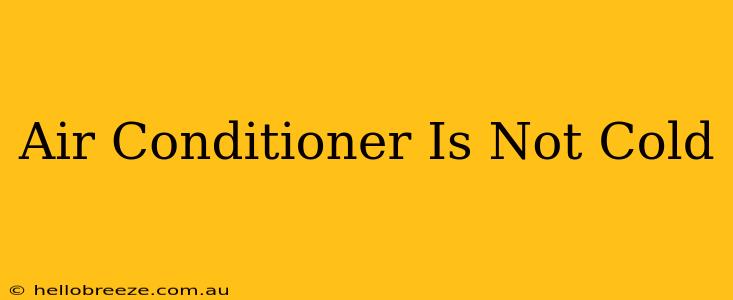Is your air conditioner blowing warm air instead of the cool relief you need? A malfunctioning AC unit can be incredibly frustrating, especially during a heatwave. This comprehensive guide will walk you through the common reasons why your AC isn't cold and how to troubleshoot the issue. We'll cover everything from simple fixes you can do yourself to when it's time to call a professional.
Common Reasons Why Your AC Isn't Cold
Several factors can contribute to your air conditioner failing to produce cool air. Let's explore the most frequent culprits:
1. Dirty Air Filter: The Easiest Fix
This is often the first and most important thing to check. A clogged air filter restricts airflow, preventing your AC from effectively cooling your space. A dirty filter can significantly reduce efficiency and lead to warm air blowing.
- Solution: Locate your air filter (usually near the indoor unit). Remove it and inspect it. If it's dirty or dusty, replace it with a new one. For reusable filters, clean them thoroughly with warm water and mild soap, allowing them to dry completely before reinstalling.
2. Refrigerant Leaks: A Professional's Job
Refrigerant is crucial for cooling. Leaks can cause your AC to stop blowing cold air altogether. Identifying and repairing refrigerant leaks requires specialized tools and knowledge, so it's best to call a qualified HVAC technician for this issue. Attempting to repair a refrigerant leak yourself can be dangerous.
3. Frozen Evaporator Coils: A Sign of Trouble
Ice buildup on the evaporator coils can restrict airflow and prevent proper cooling. This can be caused by a variety of factors, including:
-
Dirty air filter: As mentioned above, a clogged filter restricts airflow, leading to freezing.
-
Low refrigerant: Insufficient refrigerant can also cause freezing.
-
Faulty blower motor: A malfunctioning blower motor can disrupt airflow, resulting in ice formation.
-
Solution: If you suspect frozen coils, turn off your AC unit immediately to prevent further damage. Let the ice melt completely before restarting the unit. If the problem persists, contact an HVAC professional.
4. Problems with the Condenser Unit: Outdoor Inspection Needed
The condenser unit (located outside) is responsible for releasing heat. Problems with the condenser, such as dirty coils, a malfunctioning fan motor, or a clogged drain line, can impact cooling performance.
- Solution: Inspect the condenser unit for debris or obstructions. Clean the coils using a coil cleaning brush or a garden hose (avoid high-pressure water). If the fan motor isn't working or the drain line is clogged, it's time to call for professional assistance.
5. Electrical Issues: Check the Breaker Box
A tripped breaker or faulty wiring can prevent your AC from functioning correctly.
- Solution: Check your home's breaker box for a tripped breaker related to your AC unit. If the breaker is tripped, reset it. If the breaker continues to trip, there may be an electrical problem that requires professional attention.
When to Call an HVAC Technician
While some minor issues can be addressed independently, certain problems require the expertise of a qualified HVAC technician. Contact a professional if:
- You suspect a refrigerant leak.
- The evaporator coils are frozen despite cleaning the filter.
- The condenser unit shows signs of significant damage or malfunction.
- You're unsure about the cause of the problem.
- You've tried basic troubleshooting steps, but the problem persists.
By following these troubleshooting steps, you'll hopefully get your air conditioner blowing cold again quickly. Remember, addressing the problem promptly can prevent further damage and potentially save you money in the long run. Don't hesitate to call in a professional for more complex issues. Your comfort depends on it!

